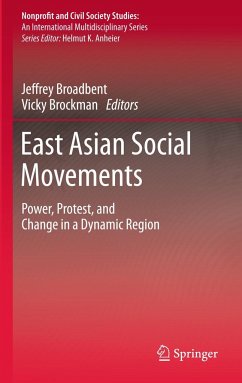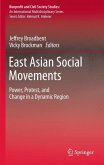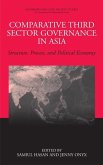In the study of civil society and social movements, most cases are based in Western Europe and North America. These two areas of the world have similar histories and political ideals and structures in common which in turn, affect the structure of its civil society. In studying civil society in Asia, a different understanding of history, politics, and society is needed. The region's long traditions of centralized, authoritarian states buttressed by Confucian and in some cases Communist ideologies may render this concept irrelevant.
The chapters in this international volume cover most of the areas and countries traditionally defined as belonging to East Asia: Japan, Taiwan, South Korea, Hong Kong, Singapore and China. The case studies included in this volume confront the utility of using the Western concept of civil society, represented in its most active form - social movements - to think about East Asia popular politics. Along with providing an array of important casestudies of social movements in East Asia, the introduction, chapters and conclusion in the book take up three major theoretical questions:
the effect of the East Asian cultural, social and institutional context upon the mobilization, activities and outcomes of social movements in that region,the role of social movements in larger transformative processes,utility of Western social movement concepts in explaining social movements in East Asia.
This book will be of interest to two major groups of readers, those who study East Asia and those who pursue social movements and civil society, as well as politics more generally.
The chapters in this international volume cover most of the areas and countries traditionally defined as belonging to East Asia: Japan, Taiwan, South Korea, Hong Kong, Singapore and China. The case studies included in this volume confront the utility of using the Western concept of civil society, represented in its most active form - social movements - to think about East Asia popular politics. Along with providing an array of important casestudies of social movements in East Asia, the introduction, chapters and conclusion in the book take up three major theoretical questions:
the effect of the East Asian cultural, social and institutional context upon the mobilization, activities and outcomes of social movements in that region,the role of social movements in larger transformative processes,utility of Western social movement concepts in explaining social movements in East Asia.
This book will be of interest to two major groups of readers, those who study East Asia and those who pursue social movements and civil society, as well as politics more generally.
From the reviews:
"East Asian Social Movements is a very timely collection for scholars, researchers, and practitioners interested in, wrestling with, and working with the dynamic relationships between and among social movements, nonprofit and voluntary organizing, democratic processes, culture, and context. ... The thought-provoking collection merits the attention of all studying and working in the international and interdisciplinary field of social movements and nonprofit and voluntary organizing." (Yea-Wen Chen, Voluntas, Vol. 24, March, 2013)
"East Asian Social Movements is a very timely collection for scholars, researchers, and practitioners interested in, wrestling with, and working with the dynamic relationships between and among social movements, nonprofit and voluntary organizing, democratic processes, culture, and context. ... The thought-provoking collection merits the attention of all studying and working in the international and interdisciplinary field of social movements and nonprofit and voluntary organizing." (Yea-Wen Chen, Voluntas, Vol. 24, March, 2013)








